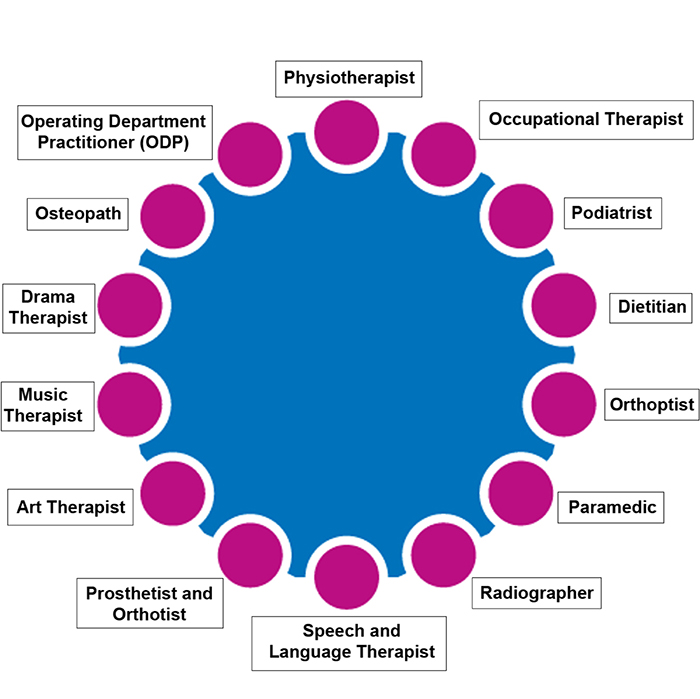Allied Health Professions (AHPs)
Click to view our current AHP vacancies
The Allied Health Professions (AHPs) are the third largest workforce in the NHS.
AHPs deliver prevention, assessment, diagnosis, intervention including treatment, discharge, and rehabilitation in a range of settings across the NHS, local authorities, the military, education and, independent and voluntary sectors. The added value AHPs bring is being recognised more widely and they are also now utilised by other organisations, for example in the fire service and care homes.
AHPs are a diverse group of practitioners but all the professions are recognised for their autonomy and ability to apply innovative solutions to challenges in an entrepreneurial way.
Click on each profession to learn more about the role, the career journey and the people - or for more information about AHPs in general look here.

Physiotherapists
Physiotherapists are registered professions who use physical approaches to promote, maintain and restore physical, psychological and social well-being, working through partnership and negotiation with individuals to optimise their functional ability and potential.
Physiotherapists address problems of impairment, activity and participation and manage recovering, stable and deteriorating conditions - particularly those associated with the neuro-muscular, musculo-skeletal, cardio-vascular and respiratory systems - through advice, treatment, rehabilitation, health promotion and supporting behavioural change.
Physiotherapy uses manual therapy, therapeutic exercise, the application of electro-physical modalities and other physical approaches in response to individual need. Physiotherapists work across sectors and settings, including acute, community and workplace settings, and with a large number of population and patient groups including children, the working population, and older people.
Here at UHD we have ED based Physiotherapists who see patients suffering with emergency fracture, joint pain, back pain or limb problems. Our physiotherapists work alongside the Medical team and Advanced Nurse Practitioners, providing an effective and responsive treatment plan.
Three of our physios - Dan, Sorcha and Greg – tell us more about their newly developed role...
Dan explains "We assess patients from a medical point of view and discuss with the clinicians if needed. Patients often wait a long time to see a physiotherapist whereas having us there starts them on that journey sooner.” Greg adds “From an individual's rehabilitation point of view, we’re able to consider what is involved in their day to day life - so what sports they play, where they work etc." which helps us provide the person focused care we pride ourselves on. The specialised view point ensure we provide a holistic approach, which helps identify potentially life altering conditions, as Sorcha describes "If we see outpatients who we're worried about, we can refer them back to ED. And while we’re in ED, we’ve picked up neck fractures or scaphoids - a really dangerous wrist injury - which can be missed on an initial x-ray".
If you are currently a final year student and you are interested in Newly Qualified Physiotherapy and Occupational Therapy positions with us in Dorset please see our microsite for more details: https://joinourdorset.nhs.uk/Therapy/.
Occupational Therapists
Occupational Therapists are registered professions can identify strengths and difficulties you may have in everyday life, such as dressing or getting to the shops, and will help you work out practical solutions.
OTs support people with a range of interventions to enable them to return to or optimise participation in all the things that people do; for example, caring for themselves and others, working, learning, playing and interacting with others. Being deprived of or having limited access to any or all of these occupations can affect physical and psychological health and hence OTs positively impact upon the wellbeing and rehabilitation of patients in most care pathways and in the broader public health and social care environment.
If you are currently a final year student and you are interested in Newly Qualified Physiotherapy and Occupational Therapy positions with us in Dorset please see our microsite for more details: https://joinourdorset.nhs.uk/Therapy/.
Podiatrists
Podiatrists are trained to diagnose and treat abnormal conditions of the feet and lower limbs.
Podiatrists provide essential assessment, evaluation and foot care for a wide range of patients with a variety of conditions both long term and acute. Many of these fall into high risk categories such as patients with diabetes, cerebral palsy, peripheral arterial disease and peripheral nerve damage where podiatric care is of vital importance.
Many podiatrists have become further specialised into either the area of biomechanics or surgery. Biomechanics is often associated with treating sports related injuries but spans across a wide range of conditions including children and the elderly.
Dietitians
Dietitians are uniquely qualified to translate scientific information about nutrition and food into practical dietary advice.
Dietitians use the most up–to-date public health and scientific research on food, health and disease, which they translate into practical guidance to enable people to make appropriate lifestyle and food choices. Dietitians are the only nutrition professionals to be regulated by law, and are governed by an ethical code to ensure that they always work to the highest standard.
Dietitians work in the NHS, private practice, industry, education, research, sport, media, public relations, publishing, government and Non-Government Organisations (NGOs). Dietitians advise and influence food and health policy across the spectrum from government, to local communities and individuals.
Orthoptists
Orthoptists work in acute hospital and community settings in health and education often as part of a multi-disciplinary medical, nursing and AHP team.
Orthoptic clinical practice encompasses both diagnosis and treatment and is wide ranging. Orthoptists help premature infants with retinopathy of prematurity, children with reduced vision due to squint, adults and children with eye movement defects due to diabetes, hypertension, endocrine dysfunction, cancer, trauma and stroke. Extended scope orthoptic practitioners now work in high volume ophthalmic specialities such as glaucoma, cataract and age related macular degeneration.
Paramedics
Paramedics have a highly responsible role, often being the senior ambulance service healthcare professional in a range of emergency and non-emergency situations.
Often working by themselves, paramedics are responsible for assessing the patient's condition and then giving essential treatment. They use high-tech equipment such as defibrillators, spinal and traction splints and intravenous drips, as well as administering oxygen and drugs.
Our ambulance service is supply by the amazing SWAST team, find out more about them here.
Radiographers
Radiography can be split into two sectors: Diagnostic and Therapeutic.
Diagnostic radiographers use a range of techniques to produce high quality images to diagnose an injury or disease. They are responsible for providing safe and accurate imaging examinations and increasingly also the resulting report. Diagnostic imaging is a component of the majority of care pathways.
Radiographers are also key team members in Breast Screening and Ultrasound monitoring of pregnancy.
Therapeutic radiographers play a vital role in the treatment of cancer. They are also responsible as they are the only health professionals qualified to plan and deliver radiotherapy. Radiotherapy is used either on its own or in combination with surgery and/or chemotherapy.
Therapeutic radiographers manage the patient pathway through the many radiotherapy processes, providing care and support for patients throughout their radiotherapy treatment.
Speech and Language Therapists
Speech and Language Therapists provide life-changing treatment, support and care for children and adults who have difficulties with communication, or with eating, drinking and swallowing.
These include helping young children to access education, working with young offenders to enable them to access the programmes designed to reduce reoffending, reducing life-threatening swallowing problems in the early days after stroke and providing essential support to adults with a range of acquired neurological communication difficulties to help them return to work, and their roles in their family and society.
Prosthetists
Prosthetists are autonomous registered practitioners who provide gait analysis and engineering solutions to patients with limb loss. They are extensively trained at undergraduate level in mechanics, bio-mechanics, and material science along with anatomy, physiology and pathophysiology. Their qualifications make them competent to design and provide prostheses that replicate the structural or functional characteristics of the patients absent limb.
They treat patients with congenital loss as well as loss due to diabetes, reduced vascularity, infection and trauma. Whilst they are autonomous practitioners they usually work closely with physiotherapists and occupational therapists as part of multidisciplinary amputee rehabilitation teams.
Orthotists
Orthotists are autonomous registered practitioners who provide gait analysis and engineering solutions to patients with problems of the neuro, muscular and skeletal systems. They are extensively trained at undergraduate level in mechanics, bio-mechanics, and material science along with anatomy, physiology and pathophysiology. Their qualifications make them competent to design and provide orthoses that modify the structural or functional characteristics of the patients' neuro-muscular and skeletal systems enabling patients to mobilise, eliminate gait deviations, reduce falls, reduce pain, prevent and facilitate the healing of ulcers.
They treat patients with a wide range of conditions including diabetes, arthritis, cerebral palsy, stroke, spina bifida, scoliosis, musculoskeletal, physiotherapy, sports injuries and trauma. Whilst they often work as autonomous practitioners they increasingly often form part of multidisciplinary teams such as within the diabetic foot team or neuro-rehabilitation team.
Art therapists
Art therapists use art as a form of psychotherapy to encourage clients to explore a variety of issues including emotional, behavioural or mental health problems, learning or physical disabilities, life-limiting conditions, neurological conditions or physical illnesses.
People of all ages from children to the elderly, regardless of artistic experience, use art therapy in this way as an aid to supporting them with their particular concern. It is not a diagnostic tool but rather a mode of communication and expression.
Music therapists
Music therapists engage clients in live musical interaction so as to promote an individual's emotional wellbeing and improve their communication skills. Clients do not need to have any previous experience of playing a musical instrument (or even singing) as this established psychological clinical intervention utilises their unique connection to music and the relationship established with their therapist to help: develop and facilitate communication skills, improve self-confidence and independence, enhance self-awareness and awareness of others, and improve concentration and attention skills.
Dramatherapists
Dramatherapists are both clinicians and artists that draw on their knowledge of both theatre/drama and therapy to use performance arts as a medium for psychological therapy. Clients are able to explore a wide variety of different issues and needs from autism and dementia to physical/sexual abuse and mental illness in an indirect way leading to psychological, emotional and social changes.
Dramatherapists can be found in many varying settings such as schools, mental health care, general health social care, prisons and in the voluntary sector.
Osteopaths
Osteopaths take a holistic view of the structure and function of the body to diagnose and treat a wide variety of medical conditions. Their work is centered on the principle that the skeleton, muscles, ligaments and connective tissues of an individual need to function smoothly together so as to maintain wellbeing.
Osteopaths use a number of non-invasive treatments such as touch, physical manipulation, stretching and massage to restore bodily equilibrium through increasing the mobility of joints, relieving muscle tension, enhancing blood and nerve supply to tissues, and encouraging an individual's own healing mechanisms.
Operating Department Practitioners (ODPs)
Operating Department Practitioners (ODPs) are highly skilled healthcare practitioners that support patients of all ages during each phase of the patient's perioperative care:
- Anaesthetic - provide patient-centred care and prepare specialist equipment and drugs
- Surgical - prepare all the necessary equipment and instruments for operations and providing these to the surgical team during the operation
- Recovery - supporting the patient throughout their time in the recovery ward, assessing vitals and fitness for return to the ward
As well as providing this specialised care, ODPs are responsible for preparing the operating theatre and maintaining communication between the surgical team, operating theatre and wider hospital.
ODPs typically work in operating departments however their skills are increasingly being needed in other critical care areas within a hospital.









